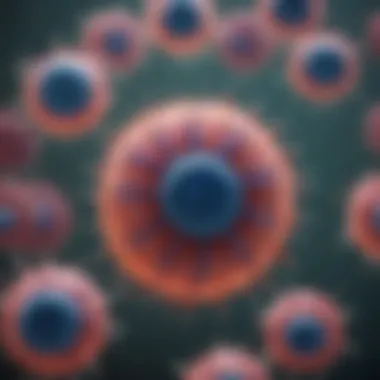The Life of Henrietta Lacks: Ethics and Innovation


Intro
Henrietta Lacks was a modest African American woman whose contributions to science have had profound implications. Born in 1920 in Roanoke, Virginia, her life reflects the intersection of race, ethics, and medical innovation. Despite her passing in 1951, her legacy lives on, primarily through cells taken from her without her permission. This raises significant questions about informed consent in medicine and the treatment of African Americans in the healthcare system.
The cells derived from her tumor, known as HeLa cells, were unique. They could multiply indefinitely in laboratory conditions, making them invaluable for a variety of research applications. Researchers used HeLa cells to develop the polio vaccine, study cancer, and even test the effects of radiation and toxic substances. However, the means by which these cells were obtained have spurred intense ethical debates. This article explores Lacks' life, the circumstances of her cell collection, and the ongoing implications of her story in the field of medicine.
Overview of Research Topic
Brief Background and Context
Henrietta Lacks was admitted to Johns Hopkins Hospital in 1951 for treatment of cervical cancer. During her treatment, doctors took a sample of her tumor without informing her. This was a common practice at the time, especially among African Americans, who often received inadequate care or were subjected to unethical treatment.
The cells from her tumor were cultivated by Dr. George Gey, leading to the creation of HeLa cells. These cells became instrumental in many scientific breakthroughs but were also at the heart of ethical discussions regarding patient consent. Lacks' background as an African American woman in a biased healthcare system adds a crucial layer of complexity to the narrative.
Importance in Current Scientific Landscape
Today, the story of Henrietta Lacks resonates deeply within the context of bioethics, patient rights, and racial equity in healthcare. The scientific community acknowledges her contribution but often overlooks the ethical violations surrounding the use of her cells.
Understanding her story is vital for current healthcare practices. It serves as an essential case study for discussions on consent and the moral obligations of researchers toward their subjects. In a world where medical technology continues to advance, Lacks' legacy underscores the need for robust ethical frameworks that prioritize the rights and dignity of all individuals.
Methodology
Research Design and Approach
This article adopts a qualitative narrative analysis approach. By examining various sources, including academic articles, books, and historical documents, it constructs a coherent narrative of Henrietta Lacks’ life and the medical advancements stemming from her cells. Further, it explores ethical implications through case studies and contemporary discussions.
Data Collection Techniques
Data was collected from multiple primary and secondary sources. Notable sources include the book "The Immortal Life of Henrietta Lacks" by Rebecca Skloot and numerous academic journals that focus on medical ethics and race in healthcare. Additionally, online resources like Wikipedia and Britannica provide additional insights into her life and impact on modern medicine.
Prelude to Henrietta Lacks
Henrietta Lacks' life and legacy provide a profound exploration of critical issues surrounding ethics in medical research. This section introduces her story, which serves as a key entry point into broader discussions about the intersection of race, ethics, and medical innovation. By examining the details of her life, we gain insight into the implications of her contribution to science, particularly through the unauthorized use of her cells, known as HeLa cells. These cells have played a pivotal role in numerous medical advancements, making the need to understand Henrietta's context vital for understanding contemporary ethical standards in medicine.
Background Context
Henrietta Lacks was born on August 1, 1920, in Roanoke, Virginia. She grew up in a family of sharecroppers and was largely raised in the rural South, an era marked by segregation and inequality. The social climate of her time significantly influenced her life and experiences, which is essential to comprehend when we look at the later events involving her cells.
In January 1951, Henrietta visited Johns Hopkins Hospital, where doctors discovered she had an aggressive form of cervical cancer. During her treatment, a sample of her tumor was taken without her knowledge or consent. This act of extracting cells marked the beginning of an unprecedented scientific journey, leading eventually to what we now recognize as HeLa cells. Unlike any other cells, HeLa cells possess the unique ability to replicate indefinitely, providing limitless opportunities for research.
Significance of Her Story
The significance of Henrietta Lacks' story transcends her individual experience; it brings to light ethical dilemmas that persist in medical research today. Her case raises essential questions about informed consent, the role of race in the medical landscape, and the ownership of biological materials.
Henrietta's cells have played an instrumental role in several medical breakthroughs, including the development of the polio vaccine and research into cancer treatments. However, the fact that her cells were taken without her consent illustrates a troubling aspect of medical research history. It prompts us to ask: how can we balance the need for scientific progress with the rights of individuals?
Henrietta Lacks' legacy serves as a reminder of the importance of ethical standards in medical research, particularly concerning vulnerable populations.
Understanding Henrietta's story helps contextualize the ongoing advances in biotechnology and the critical need for ethical frameworks that protect individuals involved in research. Her narrative is not just about science; it is about humanity, integrity, and the quest for justice in an often inequitable landscape.
Early Life
Understanding the early life of Henrietta Lacks is vital for comprehending the complexities of her later experiences and contributions to medical science. This section explores the foundation of her life, set against a backdrop of racial and socio-economic challenges that would later inform the ethical questions surrounding her legacy. Her formative years shaped her identity and the interactions she had within her community, influencing the context in which her cells were harvested without consent.


Family Background
Henrietta Lacks was born on August 1, 1920, in Roanoke, Virginia. She was the member of a farming family that struggled financially, living in a segregated and impoverished environment. Her parents, John and Fannie Lacks, had significant influence on her upbringing, imparting values that would sustain her throughout her life. The family faced many challenges, including systemic racism and lack of access to quality health care. This harsh reality was typical for African American families in the South during this era.
Henrietta was the great-granddaughter of enslaved individuals, which contributed to her family's strong sense of resilience. This background set the tone for her life, filled with hardships that would later intersect with medical ethics and research. Understanding her family context is crucial as it forms the backdrop against which her story unfolds, providing insight into the societal hurdles she faced.
Childhood and Education
Henrietta grew up in a rural community that lacked proper educational resources. She attended a segregated school, which limited her exposure to broader educational opportunities. Despite these challenges, Henrietta was known for her spirited personality and strong determination.
Education for African American children at that time was often subpar, leading many to drop out early. This was true for Henrietta. She completed only an eighth-grade education before leaving school to help support her family. This decision reflects the priorities and struggles of many families in her community, where survival often took precedence over formal education. The gaps in her formal education would later resonate in discussions about informed consent and comprehension regarding her medical treatment.
Marriage and Family Life
At the age of 14, Henrietta married David Lacks, and they started a family soon after. They had five children: Lawrence, Sonny, Deborah, and the twins, in addition to a child who died shortly after birth. Family life for Henrietta was challenging, characterized by financial instability and the need for hard labor in the tobacco fields.
Henrietta’s commitment to her family was strong. However, she also dealt with the strains typical of marriages during hardships. The stress of poverty, combined with societal expectations, added complexity to her personal life. David's involvement in the local community and subsequent challenges further affected their home dynamic.
Understanding her family life provides essential context when examining the layers of her story. It highlights the intersection of familial responsibility and the medical issues that arose later in her life, ultimately leading to the harvesting of her cells.
The life of Henrietta Lacks is not just a tale of scientific discovery but also a portrait of the societal implications tied to race, consent, and ethics.
In summary, the early life of Henrietta Lacks is integral to understanding her as a person and her significance in the world of medical science. The socio-economic and racial challenges she faced through her family background, education, and marriage not only influenced her identity but also set the stage for the ethical discussions that arose in later years.
The Medical Diagnosis
The examination of the medical diagnosis in Henrietta Lacks' life provides critical insight into the foundational events that set the stage for the ethical dilemmas surrounding her HeLa cells. Understanding her diagnosis not only reveals the medical context of her treatment but also highlights significant issues regarding consent and the treatment of African American patients during that era. These elements are essential in appreciating the broader implications of her story within the fields of ethics and medical innovation.
Discovery of Cervical Cancer
In January 1951, Henrietta Lacks visited John Hopkins Hospital to address abnormal bleeding. Here, doctors found a tumor on her cervix. After undergoing a physical examination, Dr. George Gey, a prominent researcher, collected cells from her tumor without her knowledge. This discovery was pivotal because it introduced the world to HeLa cells, which proved to exhibit remarkable qualities for research. Unlike other cells, HeLa cells thrived indefinitely in culture, which was revolutionary at the time. Their discovery marked a turning point in medical research, particularly in cancer studies. However, the method by which these cells were obtained raises urgent ethical questions regarding patient consent.
Hospitalization and Treatment
Henrietta's treatment began shortly after the diagnosis of cervical cancer. She underwent radium treatment, a common procedure at the time, aimed at killing cancer cells. The methods used during her hospitalization reflected the medical practices of the 1950s, which often lacked patient-centered care and transparency. Henrietta was not informed about the cells being taken for research purposes. This lack of informed consent is a critical issue. It highlights how race and socio-economic status influenced medical ethics and patient rights. Her treatment ultimately failed, leading to her death in October 1951, but the cells harvested from her have since been used in countless scientific advancements. Her experience underscores the persistent need for ethical reform in medical research practices.
The Harvesting of HeLa Cells
The harvesting of HeLa cells marks a pivotal moment in medical history. This section delves into why these cells, originally obtained from Henrietta Lacks in the 1950s, became a cornerstone in scientific research. HeLa cells are unique because they are the first immortal human cell line, meaning they can divide indefinitely in a laboratory setting. This property has made them invaluable for various research applications. The cells have helped in the development of vaccines and treatments, serving as a universal model for studying human biology.
Medical Procedures in the 1950s
In the 1950s, medical procedures related to cancer diagnosis and treatment were rudimentary compared to today. When Henrietta Lacks visited Johns Hopkins Hospital for treatment of her cervical cancer, surgical practices involved invasive methods. Doctors often performed radical surgeries, which could lead to complications. For Lacks, a biopsy was conducted without her knowledge of its full implications.
Medical practices emphasized the need for tissue samples to understand cancer better. However, proper informed consent was not standard practice. As a result, when doctors harvested Lacks' cells during her treatment, they did not obtain consent. This lack of transparency raised significant ethical concerns, which lingered long after her cells were utilized for research.
Informed Consent and Ethical Implications
The issue of informed consent is crucial when analyzing the use of HeLa cells. At the time, no legal requirements mandated medical professionals to inform patients that their tissues could be used for research. Consequently, Henrietta Lacks' cells were taken without her consent, leading to a legacy of ethical questions.
"The Lacks family's struggle for recognition and justice highlights the broader conflicts between medical progress and individual rights."
This oversight has prompted changes in how consent is approached in the medical field. The lack of informed consent in Lacks' case serves as a cautionary tale. It illustrates the importance of ensuring that research subjects are aware of and agree to how their biological materials will be used.


The implications extend beyond Lacks' story. They inform contemporary discussions on bioethics, race, and health equity. Each dimension of this ethical dilemma underscores a need for reform in medical ethics and a deeper understanding of patients' rights.
The Role of HeLa Cells in Research
The use of HeLa cells has transformed many fields of biological research. HeLa cells, named after Henrietta Lacks, became the first immortal human cell line. This distinction not only marked a turning point in medical science but also raised important ethical and moral questions regarding consent and ownership of biological materials. In this section, we will explore how HeLa cells contributed to significant advancements in medicine and the ethical considerations that accompany their use.
Development of the Polio Vaccine
One of the most notable contributions of HeLa cells was in the development of the polio vaccine. In the late 1950s, researchers used these cells to test the efficacy of the vaccine developed by Jonas Salk. The rapid reproduction of HeLa cells allowed for comprehensive and efficient testing. Before the widespread availability of the vaccine, polio was a devastating disease that paralyzed thousands of children each year. With the help of HeLa cells, scientists were able to produce and evaluate the vaccine faster than ever, leading to its public distribution and a significant decline in polio cases.
Cancer Research Advances
HeLa cells have also been crucial in cancer research. Their ability to divide indefinitely in laboratory settings has helped scientists understand how cancer cells operate. Researchers have used HeLa cells to investigate the mechanisms of tumor formation, cell cycle regulation, and responses to various treatments. This has led to breakthroughs in identifying how certain cancers spread and progress. Furthermore, studies using HeLa cells laid the groundwork for developing chemotherapeutic agents, enhancing the fight against cancer.
Other Medical Innovations
The impact of HeLa cells stretches beyond polio and cancer. They have contributed to numerous other medical innovations. For example, HeLa cells played a role in advancing gene mapping, leading to significant insights about genetic disorders. They have been utilized in AIDS research and vaccine development, particularly for viruses such as hepatitis. The diverse applications of HeLa cells showcase their importance in understanding human health and disease, propelling numerous scientific discoveries forward.
The contributions of HeLa cells to medical science cannot be overstated. However, their use opens a dialogue about the necessity of informed consent and the rights individuals have over their biological materials. The legacy of Henrietta Lacks continues as it urges the scientific community to re-evaluate ethical practices in research.
Ethical Considerations
The discussion of ethical considerations in medical research is crucial, especially when it comes to cases like that of Henrietta Lacks. Her story reveals significant ethical dilemmas surrounding informed consent, race, and the exploitation of marginalized populations within medical research. This section aims to unpack these key elements, highlighting their relevance in contemporary discussions about ethics in medicine.
Racial and Social Implications
The racial context of Henrietta Lacks' story cannot be overlooked. She was an African American woman, and her cells were taken without her permission during a period when racial inequalities were rampant. This raises the issue of how people of color have historically been subjected to unethical medical practices. The exploitation of Black bodies in scientific research has deep roots. Henrietta's experience is a reflection of a broader trend in which marginalized communities are used as instruments for scientific advancement without appropriate recognition or remuneration.
In Henrietta's case, the collection of HeLa cells without her knowledge exemplifies a troubling aspect of medical ethics. Many in the African American community feel that these practices continue into the present day. Disparities in healthcare access and the prevalence of mistrust towards medical institutions often stem from historical injustices, like those seen in Henrietta’s story. Inequities in treatment persist, as seen in the reluctance of individuals from marginalized backgrounds to participate in research studies. Their fears are often rooted in the memories of exploitation, leading to lower participation rates in crucial medical studies.
Legacy of Consent in Medical Research
The legacy of Henrietta Lacks emphasizes the importance of informed consent and respects the autonomy of individuals in medical research. Before her story came to light, the idea of consent was not as rigorously scrutinized in medical research as it is today. The HeLa cells were instrumental in groundbreaking medical advancements, but the ethical breach experienced by Henrietta serves as a reminder of what can happen when consent is ignored.
In modern research, the principles of informed consent have evolved to prioritize the rights of individuals. Researchers are now mandated to obtain clear consent before harvesting biological materials, ensuring that participants are fully informed about how their samples will be used. This change has been fundamental in promoting ethical research practices.
In closing, the ethical considerations surrounding Henrietta Lacks' life and legacy provide a vital framework for addressing issues of race, consent, and exploitation in medical research. The changes inspired by her story can only lead to improved ethical standards that respect the dignity and rights of all individuals in future research endeavors.
The Impact on the Lacks Family
The legacy of Henrietta Lacks extends far beyond her contributions to science. It has profoundly affected her family, shifting their lives and instigating conversations about ethics in medical research. The Lacks family was largely unaware of the extensive use of HeLa cells when Henrietta’s cells were first taken. This lack of knowledge led to a sense of alienation from the scientific community and the commercial success that followed the use of her cells. Understanding the implications of HeLa cells on the Lacks family illuminates the ethical complexities surrounding consent and recognition in medical research.
Awareness of HeLa Cells
For many years, the Lacks family did not know that Henrietta’s cells were being used in research. This fact only came to light through media coverage and scholarly articles about the HeLa cells. In recent decades, the family has come to recognize the significant role these cells played in advancements in medicine. However, this awakening brought mixed emotions. Some family members express pride at their mother’s posthumous impact, while others feel anger and sadness about her lack of consent.
The increase in awareness has sparked conversations within the family about their identity and legacy. They now understand that Henrietta’s cells were critical for developing vaccines and treatments. Yet, the knowledge also raises questions about whose story is being told and who gains from this medical progress.
"The world knows my mother’s cells, but they don’t know her name."
– A Lacks family member
Personal Struggles and Health Issues
The impact of Henrietta Lacks’ story is not just academic; it is deeply personal. Family members have faced numerous health issues, prompting reflections on the ethical treatment of patients, particularly in minority communities. The Lacks family deals with their own health challenges, some even believing there is a genetic element tied to Henrietta’s cancer. This link to her medical history has made them acutely aware of how systemic issues within the healthcare system can affect African American families.


Moreover, the stigma surrounding Henrietta’s cancer diagnosis has led to personal struggles. Some family members report experiencing discrimination and health disparities when seeking medical care. Their experiences underscore the broader issues raised by Henrietta’s story about race, health equity, and the responsibility of medical institutions.
The Lacks family's journey reveals that the ethical discussions surrounding HeLa cells are inseparably linked to their personal narratives. Their continued advocacy for acknowledgement and justice highlights the need for a more ethical framework in medical research, one that includes both respect for patients and transparent communication.
Scientific Community Response
The scientific community's response to the events surrounding Henrietta Lacks has been transformative. This case serves not only as a catalyst for change in research ethics but also as a reflection of broader social issues. The handling of Henrietta’s cells raised vital questions about consent, ownership, and the moral obligations scientists hold towards individuals who contribute to medical advancement, albeit unknowingly. As a result, this situation has created a ripple effect throughout the medical research landscape, particularly in how biological materials are treated.
Changes in Research Protocols
In the years following the disclosure of the ethical breaches associated with Henrietta Lacks, there has been a significant shift in research protocols. Various institutions have enacted stricter guidelines to ensure that informed consent is prioritized. Researchers now must provide thorough explanations of their studies to participants, aiming to foster transparency and trust.
- Informed Consent: Researchers are required to obtain explicit permission from individuals before collecting biological samples. This process often involves comprehensibility, allowing participants to understand both the benefits and risks involved in research.
- Ethics Committees: The establishment and reliance on Institutional Review Boards (IRBs) have increased. These boards consist of diverse members tasked with reviewing research proposals to ensure ethical appropriateness.
- Participant Rights: Libraries of information regarding participant rights have been developed. These documents help individuals make well-informed decisions.
Such changes signify the scientific community's commitment to rectifying past mistakes, though challenges remain.
Biological Material and Ownership Disputes
The Lacks case has blurred the lines regarding the ownership and commercialization of biological materials. Before this incident, there were few guidelines addressing who possesses rights over cells and tissues. Today, it remains a contentious issue among bioethicists, researchers, and legal experts.
- Patenting Biological Material: Scientific advancements using HeLa cells prompted discussions about whether biological materials can be patented. The legality of owning cells, particularly those that thrive in laboratories, is still debated.
- Research Benefits vs. Ownership: The benefits arising from HeLa cells may suggest that researchers should acknowledge Henrietta Lacks and her family, acknowledging their unwitting role in scientific breakthrough. This creates a contradiction between utilizing biological materials for innovation and compensating or informing the contributors.
- Ethical Frameworks: Biobanks and institutions are increasingly crafting frameworks to ensure ethical stewardship of biological resources. Understanding ownership rights is critical in forming a viable bridge between scientific innovation and ethical accountability.
"The case of Henrietta Lacks illustrates the complexity of ethical considerations in medical research, where benefits gained must be weighed against the rights and dignity of individuals involved."
Reflecting on these aspects allows for a deeper understanding of how Henrietta's legacy continues to influence ethical practices in medical research while inciting ongoing debates about ownership and responsibility.
Cultural Legacy
The cultural legacy of Henrietta Lacks extends far beyond her unfortunate circumstances, encapsulating themes of ethics, race, and the pursuit of scientific progress. This legacy has sparked significant discourse on how society views medical innovation and its implications, particularly for marginalized communities. It serves as a stark reminder of the ethical considerations that must accompany research, especially when it involves vulnerable populations.
Publications and Media Portrayal
The story of Henrietta Lacks has found its way into a variety of publications and media formats, creating a rich narrative that engages diverse audiences. One notable work is Rebecca Skloot's book, "The Immortal Life of Henrietta Lacks," which brought attention to her story by intertwining her life's history with the scientific journey of HeLa cells. The book has been influential in bringing the conversation about ethics in medical research into public consciousness.
Media portrayals, including documentaries and films, have also played a crucial role. These adaptations often emphasize the ethical breaches and injustices faced by Lacks and her family. They have successfully provoked dialogue about the need for informed consent, the rights of individuals in medical research, and the ongoing implications this has in modern scientific practice. By humanizing Lacks, these narratives encourage empathy and understanding, allowing audiences to grasp the complex intersections of race, gender, and science.
Influence on Contemporary Bioethics
The impact of Henrietta Lacks on contemporary bioethics cannot be overstated. Her story has catalyzed significant changes in ethical standards in medical research. The situations surrounding the use of her cells have led to critical discussions around informed consent, emphasizing the need for transparency between researchers and participants. This shift in focus has prompted institutions and governing bodies to reevaluate their protocols related to participant rights.
Moreover, the legacy of Henrietta Lacks has contributed to a growing awareness of racial disparities in medicine. Discussions in bioethics must consider how historical injustices, like those experienced by Lacks, inform current practices. Ethicists and researchers today face the dilemma of balancing scientific advancement with moral responsibility. They must ensure that participants, especially from minority backgrounds, are treated with respect and dignity.
Her influence continues to resonate, serving as a foundational case study in ethics courses and research institutions. This evolution in bioethical thought illustrates how a single narrative can shift paradigms, creating a more equitable landscape in future medical research.
"The legacy of Henrietta Lacks is not just in her cells; it is in the conversations it has sparked about ethics, race, and rights in the scientific community."
By exploring the cultural legacy of Henrietta Lacks, society gains valuable insights into the ethical landscapes of the past and present. The conversations initiated by her experience are vital for shaping a future that prioritizes justice in medical innovation.
Closure
The conclusion of this article serves as a crucial element, synthesizing the complex narrative of Henrietta Lacks and the multifaceted ethical landscape surrounding the use of her cells in medical research. It encapsulates not only her personal story but also the broader implications for bioethics, race relations, and scientific progress.
Reflection on Henrietta Lacks’ Legacy
Henrietta Lacks’ legacy extends beyond her contribution to medical science. The HeLa cells derived from her cancerous tumor ushered significant advancements in various fields, including virology and gene mapping. However, her story also prompts essential conversations about consent, particularly in communities marginalized by race and socioeconomic status. The disregard for her autonomy reflects a historical pattern of exploitation in medical practice. Thus, her legacy is dual-edged; it signifies both scientific triumph and a stark reminder of the ethical obligations owed to individuals in research. Henrietta remains a symbol, urging ongoing dialogue about patient rights and informed consent.
Lessons for Future Research Ethics
The ethical dilemmas presented by the HeLa cells provide important lessons for future medical research. First, there is an imperative need for rigorous standards regarding informed consent. Institutions must prioritize clear communication with participants about the risks and benefits of their involvement in research. Furthermore, acknowledging the social context of research subjects can help tailor ethical frameworks that protect diverse populations.
Additionally, the case of Henrietta Lacks illustrates the necessity for transparency in research practices. Researchers should openly share how biological materials are used, ensuring that individuals have knowledge and agency over their biological contributions. Establishing frameworks that support equitable access to the benefits of research will also be essential.



